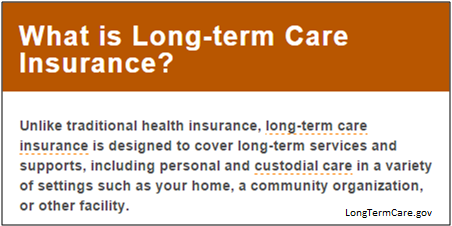Consumer Planning Blog
Never miss any update
Subscribe to the Consumer Plannig Blog newsletter today to receive updates on the latest news from our carriers.
Your privacy is important to us. We have developed a Privacy Policy that covers how we collect, use, disclose, transfer, and store your information.
LTCI 101: The language of long-term care insurance
When you begin your research of long-term care insurance, it’s completely understandable to be a little confused at first. Long-term care can often feel like it has its own language. Elimination period – what is that? Inflation protection – do I need this? This might even leave you wondering, “what exactly is long-term care insurance, anyway?” LongTermCare.Gov defines long-term care insurance (LTCI) as:

As you continue your long-term care research and determine what type of long-term care insurance best fits you or your loved one’s needs, here is a helpful glossary of terms that you may encounter along the way:
- Activities of Daily Living (ADLs) – The activities of daily living (or “ADLs”) are a benchmark used to determine when a policyholder can be deemed eligible to receive LTCI benefits. These basic activities are eating, dressing, bathing, using the toilet, continence and transferring to and from a bed or chair.
- Daily Benefit Amount – The maximum amount that your policy will provide toward the cost of long-term care on a daily basis. This can also be calculated weekly or monthly.
- Elimination Period – A specified number of days that you must pay for services out of pocket before your LTCI policy begins to pay for benefits. Often referred to as a waiting or deductible period.
- Free-look Period – A 30-day window following the purchase of a long-term care insurance policy in which you may cancel and receive a full refund.
- Future Purchase Option – This option is an inflation protection feature that allows the insured to purchase additional coverage periodically without providing proof of health.
- Inflation Protection – A feature within a LTC insurance policy that increases the value of benefits over time in order to keep up with the rising cost of care.
- Maximum Lifetime Benefit – The maximum amount of benefits that long-term care insurance coverage could pay.
- Shared Benefits Rider – This allows a couple to share benefits between their two policies.
- Underwriting – The process of reviewing an applicant’s individual health status in order to determine eligibility for coverage by a LTCI policy.
If you have additional questions about long-term care insurance and the options available to you, you might also find our recent posts that answer common LTCI queries (part one and part two) helpful. With your budding LTCI vocabulary, we hope that you feel more knowledgeable and at ease with your continued research.

